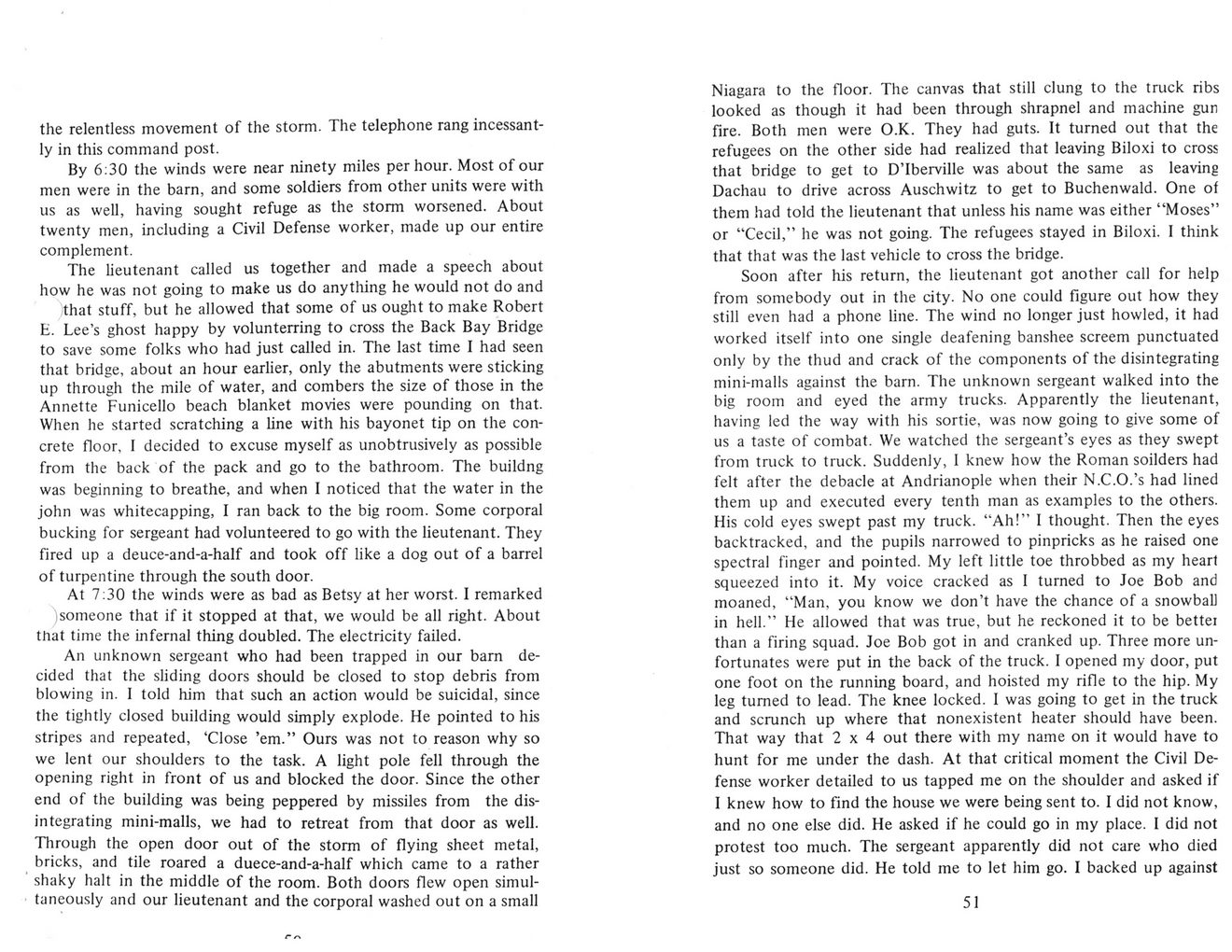This text was obtained via automated optical character recognition.
It has not been edited and may therefore contain several errors.
the relentless movement of the storm. The telephone rang incessantly in this command post. By 6:30 the winds were near ninety miles per hour. Most of our men were in the barn, and some soldiers from other units were with us as well, having sought refuge as the storm worsened. About twenty men, including a Civil Defense worker, made up our entire complement. The lieutenant called us together and made a speech about how he was not going to make us do anything he would not do and that stuff, but he allowed that some of us ought to make Robert E. Lee’s ghost happy by volunterring to cross the Back Bay Bridge to save some folks who had just called in. The last time I had seen that bridge, about an hour earlier, only the abutments were sticking up through the mile of water, and combers the size of those in the Annette Funicello beach blanket movies were pounding on that. When he started scratching a line with his bayonet tip on the concrete floor, I decided to excuse myself as unobtrusively as possible from the back of the pack and go to the bathroom. The buildng was beginning to breathe, and when I noticed that the water in the john was whitecapping, I ran back to the big room. Some corporal bucking for sergeant had volunteered to go with the lieutenant. They fired up a deuce-and-a-half and took off like a dog out of a barrel of turpentine through the south door. At 7:30 the winds were as bad as Betsy at her worst. I remarked ^someone that if it stopped at that, we would be all right. About that time the infernal thing doubled. The electricity failed. An unknown sergeant who had been trapped in our barn decided that the sliding doors should be closed to stop debris from blowing in. I told him that such an action would be suicidal, since the tightly closed building would simply explode. He pointed to his stripes and repeated, ‘Close ’em.” Ours was not to reason why so we lent our shoulders to the task. A light pole fell through the opening right in front of us and blocked the door. Since the other end of the building was being peppered by missiles from the disintegrating mini-malls, we had to retreat from that door as well. Through the open door out of the storm of flying sheet metal, bricks, and tile roared a duece-and-a-half which came to a rather shaky halt in the middle of the room. Both doors flew open simultaneously and our lieutenant and the corporal washed out on a small Niagara to the floor. The canvas that still clung to the truck ribs looked as though it had been through shrapnel and machine gun fire. Both men were O.K. They had guts. It turned out that the refugees on the other side had realized that leaving Biloxi to cross that bridge to get to D’lberville was about the same as leaving Dachau to drive across Auschwitz to get to Buchenwald. One of them had told the lieutenant that unless his name was either “Moses” or “Cecil,” he was not going. The refugees stayed in Biloxi. I think that that was the last vehicle to cross the bridge. Soon after his return, the lieutenant got another call for help from somebody out in the city. No one could figure out how they still even had a phone line. The wind no longer just howled, it had worked itself into one single deafening banshee screem punctuated only by the thud and crack of the components of the disintegrating mini-malls against the barn. The unknown sergeant walked into the big room and eyed the army trucks. Apparently the lieutenant, having led the way with his sortie, was now going to give some of us a taste of combat. We watched the sergeant’s eyes as they swept from truck to truck. Suddenly, I knew how the Roman soilders had felt after the debacle at Andrianople when their N.C.O.’s had lined them up and executed every tenth man as examples to the others. His cold eyes swept past my truck. “Ah!” I thought. Then the eyes backtracked, and the pupils narrowed to pinpricks as he raised one spectral finger and pointed. My left little toe throbbed as my heart squeezed into it. My voice cracked as I turned to Joe Bob and moaned, “Man, you know we don’t have the chance of a snowball in hell.” He allowed that was true, but he reckoned it to be bettei than a firing squad. Joe Bob got in and cranked up. Three more unfortunates were put in the back of the truck. I opened my door, put one foot on the running board, and hoisted my rifle to the hip. My leg turned to lead. The knee locked. I was going to get in the truck and scrunch up where that nonexistent heater should have been. That way that 2x4 out there with my name on it would have to hunt for me under the dash. At that critical moment the Civil Defense worker detailed to us tapped me on the shoulder and asked if I knew how to find the house we were being sent to. I did not know, and no one else did. He asked if he could go in my place. I did not protest too much. The sergeant apparently did not care who died just so someone did. He told me to let him go. I backed up against 51

Coast General Wordcraft-Harekins-Charles-Sullivan1982-(07)